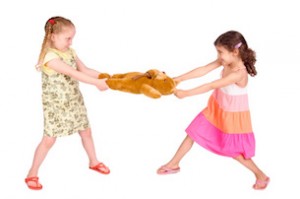Every parent has experienced play problems with their children – whether their child is the one hiding in the corner, throwing a tanty, refusing to share or being a bit bossy. It’s embarrassing but 100% normal. A child’s style of play varies based on their personality, their age and their physical surroundings.
Play IQ Expert & Paediatrician Dr Katie Heathershaw has advice about common play problems and how to solve them.
Hitting, pushing and biting
Aggressive behaviours can be very disconcerting, but they are common and normal part of development. Self control and sharing are skills that have to be learned and practiced. Hitting, snatching, pushing etc are expressions of frustration. Small children believe they are the centre of the universe, and must be taught to consider the feelings of others.
Teaching sharing (start with quick turns so the wait seems reasonable for a small child) early. Smaller children are not as patient as older children, but it is not to say that they can’t ‘take their turn’ from a very early age.
If you’re meeting with other parents and children, stay close by to encourage, praise and troubleshoot. Anticipate situations that may be challenging for your child to try to prevent aggressive behaviour from occurring in the first place.
When your child does become frustrated or aggressive, gain their full attention (so be close to them and hold their hand, rather than calling out from across a room) and give a clear message like “no hitting” in a low, firm voice. Dr Heathershaw believes it’s important to help your child understand their own feelings and behaviours by relaying them back to them: “You’re mad because you want the truck Luke is playing with.”
Then, model an alternative response … Say “Can I have a turn please?” If your child is really upset, a brief distraction may be in order: “You’re really mad, let’s bring out the tickle monster” and give them a big tickle.
“Aggressive behaviour usually settles as a child’s verbal communication, empathy and emotion regulation skills progress,” she says.
Sharing
As with aggressive behaviour, it’s important to acknowledge your child’s feelings. Dr Heathershaw suggests saying something like, “It’s frustrating when Ben knocks over your tower,” and then helping them to see the other child’s perspective by saying, “He thinks it’s so cool and wants to play, too.”
Respect their right to have some things that are their own. Give your child the option to put some toys away out of reach of little siblings or visiting friends. “Encourage turn-taking and sharing with supervised play, lots of praise, hugs, high fives, and even stickers or stamps to really reinforce the message.”
Short attention span or needing constant entertainment
Some toddlers are happy to play on their own without a lot of input from their parents, but they’re the minority and even those kids prefer to have a parent close by to check in with visually or verbally every now and again.
Your child doesn’t know the difference between play and ‘work’ (housework, gardening or paid work from home), so involve them as much as you can and encourage them to play alongside you, rather than to require your constant presence on the floor. Set an alarm or timer so you have an agreed amount of time they need to play independently, then get together.
Another way to prevent your child getting bored is to only leave a small selection of their toys on view at once and to rotate them every week.
TV, iPad or Phone
One of the most frequent questions Dr Heathershaw hears from parents is: “Is it really so bad to let my toddler watch TV or use the iPad?”
“My response, and that of influential and reputable bodies like the American Academy of Pediatrics, is to recommend no screens for those under the age of three years,” she says. “The passive nature of screens does nothing good for a young child’s development and takes up time that could be better spent actively engaged in play and interacting with others. A screen isn’t 3D, there’s no smell or taste, you can’t touch or feel it, and most importantly, when your toddler reacts in delight to what they have seen and heard, there’s no response. For some children, the viewing experience can also result in sensory overload, which they can’t regulate.”
Dr Heathershaw also cautions parents to be aware of their own behaviour when it comes to technology. “What does your toddler see you modelling? Do you pull out your phone to check your email and Facebook at every spare moment? Try to model reading a book, newspaper or magazine instead,” she says.
Reluctant to join in
Not everyone is a born extrovert. Social skills and behaviour must be modelled and taught. Try to respect your child’s temperament and feelings if they are reticent about joining in in a group.
You can prepare your child briefly for a new situation by talking to them beforehand or even showing them photos of where you’re going. Make sure they aren’t tired or hungry or ill and allow them a little time to warm up.
Try to engage your child to being joining in by playing near you, then gradually move away or encourage them to explore. For older children who are ‘shy’ about talking to new people, prepare them by asking them to think of one or two questions they could ask a new person, or an anecdote about themselves. If they can practice them in their head, it removes some of the anxiety about what to say to a new person.










pommie63 - 9 years ago
Our Grandaughter is the very proud mother of 2 year old triplets, a wonderful mother and rang us the other morning to say “It’s happened”. What’s happened we asked –The story goes like this- One of the triplets just enjoys playing by herself and her sister is a bit pushy and wants to get in her face–however “miss quiet one” had had enough and without looking up closed her fist and gave her a back hander that connected and hit her sister right above her eye. since that day she has been left alone to play by herself and “miss black eye” hasen’t been in her face once.Self justice one would say – mother and father didn’t have to solve any child dispute. The doting mother and father have 5 children, with 3 1/2 years seperating oldest to youngest. We couldn’t be prouder Great grandparents. and are so enjoying seeing them all grow, we only live a 5 minute drive away and we just love spending time with them.